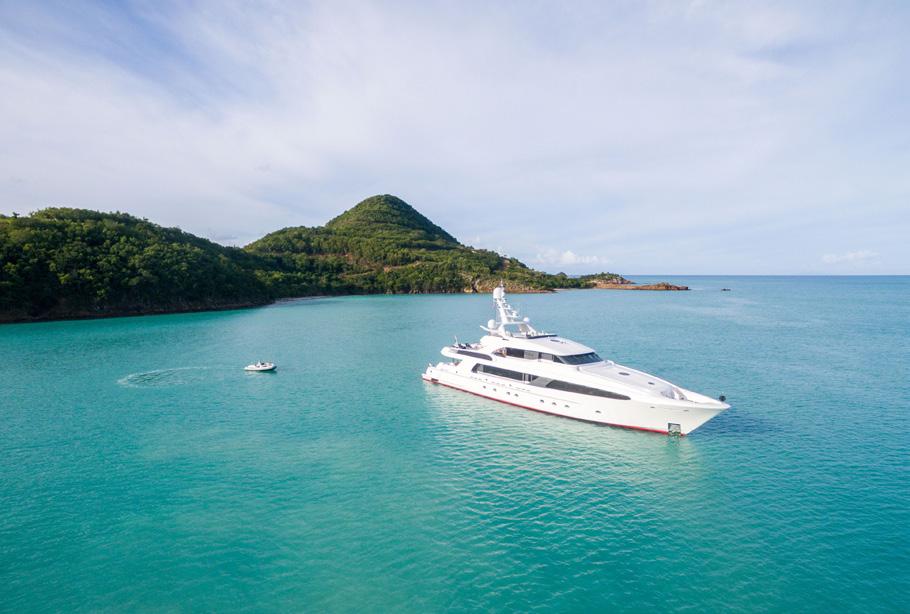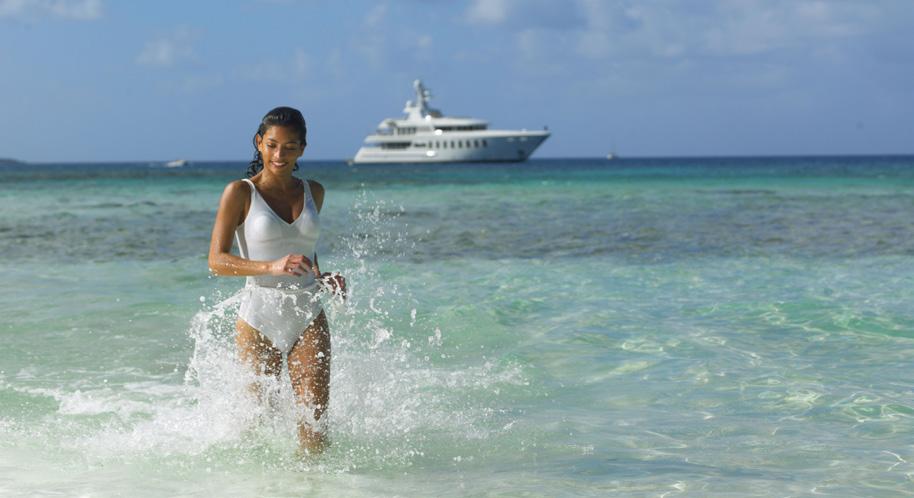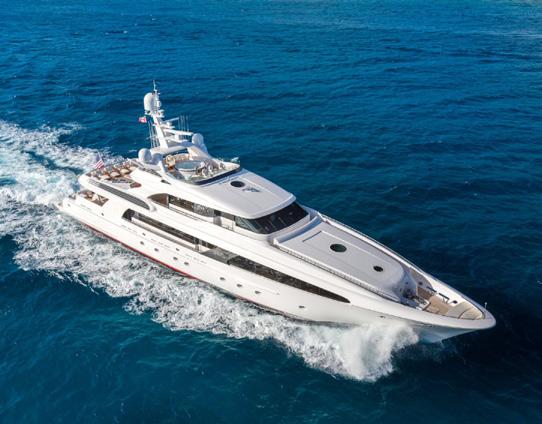
6 minute read
IN FOCUS - HEALTHY SEAS
Scientific Yacht Charters – the perfect marriage of on-water fun and eco-friendly experiences
WORDS JANINE ST.DENIS
“Eco-conscious,” “eco-friendly,” “green”… these are environmental buzz words we are hearing a lot of these days as the push to help save our planet continues within scientific communities and beyond. As outlined in Navigator’s interview with Nina Jensen on the previous pages, the oceans cover more than 70 percent of the earth’s surface and thus play an integral role in the health of our planet. Understanding our oceans, protecting them, and sustaining them is of the utmost importance. As luxury yachts need the oceans to cruise, it benefits yacht owners, charter guests, captains, crew and those within the yachting industry to work toward healthy seas. This is why the owners, captains and crews of Northrop & Johnson charter yachts HARLE, a 146-foot (44.65m) Feadship, and USHER, a 154-foot (46.94m) Delta, have teamed up with various scientific agencies to use the yachts not only for on-water enjoyment, but also for the betterment of the oceans and earth.

Shark and turtle tagging is a key element of the onboard eco-projects
This partnership between the yachts and the scientists began as early as 2015, according to HARLE’s and USHER’s Fleet Captain Carey Drake. “When we began this initiative, we partnered with The International Superyacht Society (ISS) and The International SeaKeepers Society to not only help the oceans and the environment, but also to bring scientific research into the guest experience. At the time, we were working with the two organizations to put together scientific charter itineraries that would benefit both charter guests and the scientific community. These packages included shark tagging in The Bahamas, island cleanups and more.”

The 154-foot (46.94m) USHER was built in 2007 by Delta Marine and refit in 2019
USHER has participated in shark tagging in The Bahamas.

Built in 2007, the 146-foot (44.65m) HARLE is a Feadship masterpiece with accommodation for up to 12 guests
Scientific missions can coincide with charters, allowing guests to participate should they wish
Since then, USHER and HARLE have participated in a multitude of scientific research programs with various organizations. The ownership of the yachts is extremely eco-conscious and understands the importance of preserving the oceans for both the health of planet earth but also for enjoyment. Captain Carey, who was the captain of HARLE at the time when these programs began, also is extremely eco-minded and has participated in many of these scientific programs himself.
One of the most notable programs took place aboard HARLE during an Atlantic crossing, which is an ideal time for yachts to be utilized for more intensive research as no guests are aboard. Two scientists studying plankton joined HARLE for its Atlantic crossing and set up plankton nets to be dragged during the crossing. “The whole main salon was set up as a lab,” recounted Captain Carey. “The scientists sat at the main salon table with microscopes. Samples were processed in the salon, then the data was frozen and taken to a lab for further processing once we reached the Med.” During this mission, the scientists discovered a new species of plankton. As there is not a lot of funding for scientists to travel into the middle of the ocean to search for plankton, the yacht crossing provided the perfect platform for scientific research without interfering with the yacht’s schedule, or owner or guest trips.
One of the most prominent missions that USHER has participated in was shark tagging in The Bahamas. The charter was gifted to the scientific program, although this kind of mission can also be easily done with guests aboard. The mission involved tagging sharks to understand their migratory patterns and to gain other information about the species. In addition to being a fun and exciting charter experience for guests and benefitting the scientific community and planet earth, these types of scientific partnerships with yachts also allow yacht owners and crew to get in on the excitement and fun, participating in the missions and seeing firsthand the contribution they are providing to the health of the planet.
The owner of HARLE and USHER, Captain Carey and the crew of the yachts are committed to continuing these programs. Currently the yachts are working with Florida International University (FIU) to put together trips for Spring 2021 and beyond. “One of the biggest challenges to scientific marine work is just getting out there,” says Mike Heithaus, biologist and Dean of College of Art, Sciences & Education at FIU. “Being able to work with yachts is an outstanding opportunity to integrate data and complete various programs and missions. The citizen science movement is really important to understanding what we do as scientists. For decades, the programs of Earthwatch have helped bring people in and the programs aboard yachts are kind of the mobile on-water version. Some of the programs and missions we’re discussing are surveys of sea turtles, during which scientists would tag them—possibly camera tag them—to see where they go, what they do, etc.” Heithaus maintains that missions related to sharks are extremely important as they are so vital to the Caribbean eco-system. The more scientists learn about sharks, the better equipped they are to help stabilize their environment.

With accommodation for up to 12 guests, USHER offers the best of both worlds – luxurious surroundings and eco-capabilities.

Jump in and experience all the oceans have to offer while participating in some scientific research.
The Caribbean presents an ideal place to interact with these animals. Furthermore, when tagging sharks, owners, charter guests, captains and crew are able to participate in the initial tagging exercise, and they can also follow along with the shark as they travel the globe via the tag. Heithaus says FIU also is working on some whale and dolphin projects for the future. Other projects include deploying reef cameras, collecting water samples to monitor microplastics, filtering water samples for DNA, and other missions that are only able to take place as scientists move from point A to point B, say during a yacht charter or crossing. “These types of partnerships with yachts allow us to gather data from places we can’t often get access to,” says Heithaus.
One unique aspect of HARLE and USHER that ensures these yachts are especially well-suited for scientific charters and research missions is that they benefit from a variety of support vessels that are able to host the scientific research teams if a mission is occurring during a charter, ensuring guests can participate while still enjoying a private on-water luxury holiday. Some proposed 2021 missions available include tagging and surveying sea turtles, tagging sharks, deploying cameras, censusing and tagging grouper and mahi-mahi, and deploying predator models to monitor fish response in The Bahamas around Cape Eleuthera and the Exuma Cays Land & Sea Park. In the Bahamian Andros Island area, tagging and filming silky sharks and undertaking sawfish surveys provide possible scientific charter opportunities. The Abacos Islands are best for tagging sea turtles, sharks, whales and dolphins as well as deploying cameras. A charter in the Florida Keys is ideal for missions on shark tagging and surveys of sea turtles, sperm whales and dolphins. There also are a variety of missions that can be done almost anywhere in the Caribbean and possibly further afield, which include surveying coral reef fish, collecting small crabs and shrimp for data, deploying cameras to remotely survey sharks, collecting water samples for testing and surveying whales and dolphins.
Often a yacht charter holiday is all about luxury and on-water fun, but for those eco-minded charter guests or those who want to give back, participate in some scientific research and help the oceans, a scientific yacht charter may offer the best of both worlds.
In addition to USHER and HARLE, there are many other yachts on the water with crew and owners who participate in scientific missions and give back to help the oceans and environment. If you are interested in a scientific charter, please contact your Northrop & Johnson charter broker. If you are a yacht owner interested in utilizing your yacht for scientific missions while on charter—whether it’s not in use or both—we would be happy to connect you with FIU or another scientific research firm. Contact Miriam.Cain@NorthropandJohnson.com.


